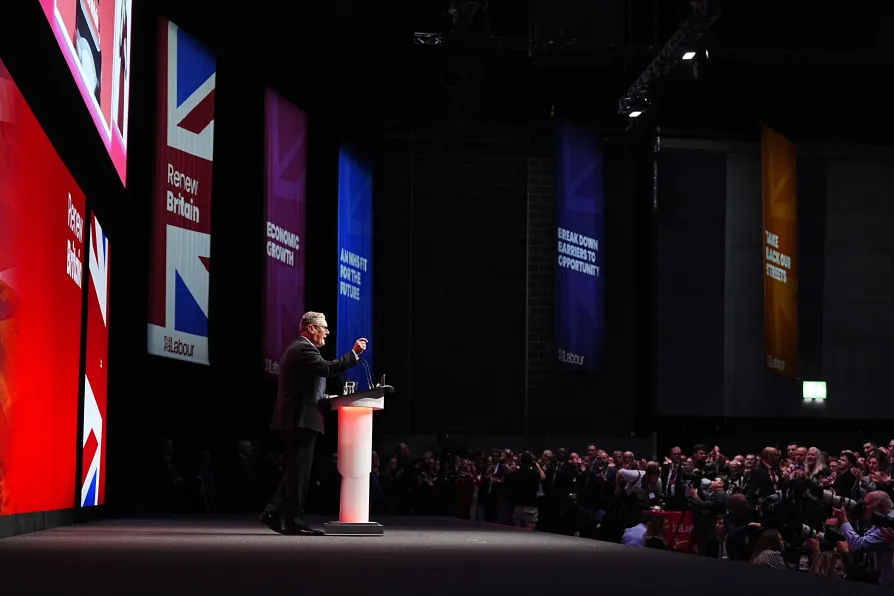
 Prime Minister Keir Starmer delivers his keynote speech to the Labour Party Conference at the ACC Liverpool, September 30, 2025
Prime Minister Keir Starmer delivers his keynote speech to the Labour Party Conference at the ACC Liverpool, September 30, 2025
WHAT are the Morning Star’s takeaways from Labour Party conference?
One, the party leadership remains in denial. Conference delegates may have rewarded the likes of Keir Starmer, Rachel Reeves and Wes Streeting with rapturous applause this week — but the mood outside the hall was completely different.
The flag-waving and standing ovations point to a rigged conference — with many delegates “deluded,” as one speaker from the floor at the Morning Star’s packed fringe meeting put it. Labour has become a hostile environment for the left — many socialist MPs stayed away, and the defeats inflicted on the government — such as over Palestine — were down to affiliated unions, not constituency party representatives.
Inside the hall many seemed to think compulsory digital ID cards were a brilliant policy, though it is almost impossible to find anyone who supports it in the real world. On the streets of Liverpool few had anything good to say about the party, and the mood of the protests at the conference gates — both the far right’s sizeable Sunday rally and the demonstrations for worthwhile causes such as opposing cuts to disability benefits — was grimmer and angrier than in previous years. There is real hatred for the government from the right, from the left, and among people who do not consider themselves political.
The disconnect is a product of Starmer’s most consistent political attribute — authoritarianism. Here is a leader who, unable to persuade Labour members to support his march to the right, used suspensions and expulsions to force it on the party, banning constituency parties even from debating contentious issues. Rule by fear has been extended to the country now he is in power — with mass arrests of peaceful demonstrators and a bid to decapitate the peace movement by charging its most prominent leaders. His withdrawal of the Labour whip from MPs who dare to stand up for their principles shows an unprecedented intolerance for dissent.
That authoritarianism was evident at conference, with some left media denied access (Declassified UK) and journalists Owen Jones and Rivkah Brown (Novara Media) having their passes revoked over “safeguarding issues” — apparently for asking awkward questions about the government’s complicity in the Gaza genocide.
There is a wider pattern of denying media outlets access to events on political grounds — there are examples of it from the Conservative Party and Reform UK as well, and of course it is the practice of the ringleader of the international right, Donald Trump. It reinforces the siloing effect of social media — with increasing numbers only exposed to narratives and “facts” that suit their existing political identities — and points to a decline in social and political pluralism with worrying implications.
As left MP Richard Burgon notes, this refusal to listen to different opinions could cripple Labour’s ability to meet the challenge of Reform UK. People advocate changes in government policy at their own risk: yet without dramatic changes in policy, of which there were none at conference (though it voted for a wealth tax, Starmer went on to explicitly rule one out in his keynote speech) there is no reason to suppose Britain’s trajectory toward a Reform-led government will change.
There are signs that the long dormant soft left of the party is waking up: Manchester Mayor Andy Burnham is levelling serious criticisms of the government and promoting left policies in an undisguised bid for the leadership. The unions, too, are unhappy and increasingly frank about it.
But all this will be too little, too late unless the left can exert mass pressure from below. It is our political failure that the biggest and angriest protest at conference was called by the far right. Whether through the People’s Assembly, “Your Party,” the Greens or union organisations like trades councils, we need mobilising vehicles that will take the fight to both Labour and Reform. How to do that should be the focus of every socialist organisation and activist.










